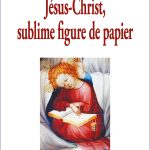
It’s been too long since I visited our French scholars of the Bible so here I continue with part 5 of Nanine Charbonnel’s table setting out the “Old Testament” sources of the Gospel narratives. In Jésus-Christ, Sublime Figure de Papier Charbonnel is presenting a case for the gospel figure of Jesus Christ being created entirely from a form of “midrashic” type composition in which diverse scriptural texts are woven together into a new story to meet new community needs.
The table below is my own adaptation of Charbonnel’s French-language multi-page table, with a few slight editorial changes and my own translations and summaries.
The work of checking every scriptural reference (they are all hyperlinked for you to check them easily too) has impressed upon me just how totally the gospels are very likely pastiches of Jewish scriptures and some non-canonical writings. There appears to be nothing left over requiring explanation as if from any other source. Jesus walking on water was not an exaggerated retelling of a biographical event where Jesus happened to be walking on a sandbank (as some have said); nor were the healing miracles exaggerations of some real-life psychological power Jesus had over those with ailments. . . . they, everything, was written as a renewal of a sacred saying or scripture. Nor is there anything new about the teaching of Jesus: everything he is narrated as having taught is a re-writing of Scriptural or proverbial teachings of the time of the evangelists.
Jesus is created as a new voice and representative of a new Israel. The kingdom of God has come, the promises have been fulfilled in Jesus. Nations, gentiles and Jews, are now one in Him. The gospels are written, surely, as a new set of scriptures through which the old are to be interpreted anew.
There is no historical person of Jesus behind the narrative. If there had been then there would be some indication of a real person that the narrative had to adapt somehow to scriptures. What we find instead, however, is a figure entirely, entirely, made up of scriptures. Scriptural rewriting is the warp and woof of what he does, what happens to him, and what he says and teaches.
Here we look at the Jewish Scripture sources for:
a. the calling of disciples and sending them out to preach
b. teachings of Jesus – to both Jews and gentiles
c. miracles of Jesus – to both Jews and gentiles
d. the fate of John the Baptist and the beginnings of the rejection of Jesus
|
The table is primarily a translation and slight modification of pages 183-226 of Nanine Charbonnel’s Jésus-Christ, sublime figure de paper. All posts archived here. (I have added the images)
|
| In Galilee: Matthew 4:12-16 | Quoting Isaiah 9:1-2 – land of the gentiles |
| The call of the apostles | = the call of Elisha by Elijah, 1 Kings 19:19-21 |
| they abandon their fishing nets | he abandoned his oxen to run after Elijah |
| Matthew 13:47 the Kingdom of God is like a fishing net | + Micah 7:2 they hunt each other with nets
+ Habbakuk 1:15 he catches them in his net |
| the twelve apostles | = the twelve tribes of Israel (Jesus is the new Moses: Exod 24:4; Deut 1:23
+ the new Joshua [=Jesus]: Josh. 3:12; 4:1-3 — “when Jesus/Joshua had crossed the Jordan God told him to choose twelve men, one from each tribe” |
| Matthew 9:9 – Matthew was at the toll office | halaf — “Alphaeus” inspired from the Hebrew root which means to change, to invert, to convert currencies. Jesus drove the money changers out of the Temple. He drives their sons, the Levi, from the Temple. This is the leitmotif of eschatological reversal (The first will be the last) “[Mergui] |
| Luke 4:16-30 – the reading in the synagogue of Nazareth: the text of Isaiah | = fulfilment of Isaiah 61:1, on the subject of the first consecration of the High Priest |
| Luke 4:38; Matthew 8; Mark 1 – the healing of the mother-in-law of Simon (Jesus makes her “rise up”.) | midrashic wordplay: mother-in-law in Hebrew is hamoth; hema is heat, fever; and homah = wall, pointing to the wall of the temple |
John 3 – the terms Jesus uses in speaking with Nicodemus : born again
|
= Book of Proverbs of Solomon 1:23
|
| John 7:34 “you will look for me but you will not find me” | = Wisdom, Proverbs 1:28 “they will look for me but will not find me” +
Hosea 5:6 “they will go to look for the lord and they will not find him” |
| Matthew 5:1-12; Luke 6:20-26 — The sermon on the mount | = Moses on Sinai (Ex 19), Elijah at Horeb (Ex 3) |
| Blessed are those who…. | = the first word in the book of Psalms; Blessed / happy is the man who…. +
Psalm 41:1-2 – Blessed are those who consider the poor, the Lord will protect them…. |
| Luke 6:31 – as you would want others to do to you, do you likewise | the golden rule = Hillel “Do not do to your neighbour what you would not like him to do to you; this is the whole Torah, he said. The rest of the commandments are commentary. Go, and study them.” (Shabbat, 31a) |
| blessings and curses | = Deuteronomy 27:11-13 Moses pronounced the blessings and curses. + all of these promises are variations of the messianic age (consolation, blessing, inheriting all, becoming sons of God) [Baeck, 140]
|
| the will inherit the earth | = Psalm 37:11 – But the meek will inherit the land |
| they will be satisfied | = Isaiah 66:11 – For you will nurse and be satisfied at her comforting breasts; you will drink deeply and delight in her overflowing abundance Psalm 17:15 – when I awake, I will be satisfied with seeing your likeness Psalm 22:26 – The poor will eat and be satisfied; |
| they will be called the children of God | Isaiah 61:6; 62:12 — But you shall be named the priests of the Lord, They shall call you the servants of our God. — And they shall call them The Holy People, |
| those who are pure in heart | Psalm 24:4 – He who has clean hands and a pure heart, |
| announcement of the Kingdom of Heaven | We know that in the late Second Temple era that the liturgy of the Rosh Hashana festival included a “kingdom prayer” calling for the coming of the kingdom of God to rule all of humanity. (Genot-Bismuth, 177) |
| The entire sermon of Matthew 5 | Identifies with the midrash of the Tanaitic preachers [Genot-Bismuth, ch 7] |
| Luke 6:6 healing the man with the withered hand | = Exodus 4:6-7 The signs God worked through Moses of his hand becoming leprous then whole |
| Mark 1 the healing and purification of the leper
|
= the conversion of the gentile by Elisha, 2 Kings 5:14 Elisha asks Naaman the Syrian to wash his leprosy in the Jordan; = the people of Israel (Miriam) stricken with leprosy, a sign of the punishment of God Num 12:10 and healing thanks to Moses + A lamb should be slain seven days after a leper is cleansed (Lev 14) |
| The miracle of the storm (Matthew 8:23; Luke 8; Mark 4) |
|
| “Let’s go to the other side” | = crossing of Jordan by Joshua/Jesus + death |
| in the boat (Mark 4:38; Jesus sleeps) |
Jonah 1:3; 1:5 |
| on a “pros-kephalaion” = pillow, something for the head | Jacob’s sleep Gen 28:11 Hebrew word mə·ra·’ă·šō·ṯāw = which translates … more precisely “a place to put his head” (rosh) |
| the wind | Hosea 13:15 the anger of God on Jonah |
| the disciples woke him, saying, “Lord, save us” | Psalm 107:23-30 in the storm their courage melted away, they cried out to God; Psalm 44:23 “Wake!, Why do you sleep, Lord?” + Isaiah 51:9 |
the storm is calmed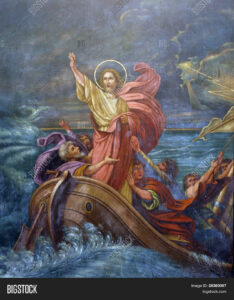 |
Psalm 78:65-66 “The Lord woke like a man from sleep… He beat back his enemies” = victory over death + Psalm 89:9 “You crush the pride of the sea; when its waves rise up you calm them.” Psalm 106:9 (LXX) epitimesi tè thalassè [=rebuke the sea] + Isaiah 51:15 |
| The miracle of the miraculous catch | |
| Luke 5 Peter’s fear | = fear of Isaiah before YHWH (Isaiah 6:5) |
| Mark 5 from one side of the lake to the other | = the two sides represent the homes of the gentiles and the Jews |
| Mark 5 – the healing of the daughter of Jairus [=Shines] chief of the synagogue | = Elijah healing the child of the widow of Zarephath – 1 Kings 17 |
| hemorrhaging woman | Origen: = the Ethiopian married by Moses (Num 12:1) = Christ gives priority to the Gentiles over Israel as suggested in Ps 68:31: “The Ethiopian will be first to stretch out her hands to God” |
| In the synagogue, the stone of stumbling (Rom 9:32) “They stumbled over the stumbling stone. 33 As it is written: “See, I lay in Zion a stone that causes people to stumble” | Isa 8:13-14 [oracle of YHWH] “he is the one you are to fear, he is the one you are to dread. 14 He will be a holy place; for both Israel and Judah he will be a stone that causes people to stumble |
| Matthew 21:42 Jesus said, “Have you never read in the Scriptures: ‘The stone the builders rejected has become the cornerstone‘ | Psalm 118:22 The stone which the builders rejected has become the cornerstone |
| Simon is named Peter | Isaiah 28:16 “So this is what the Sovereign Lord says: “See, I lay a stone in Zion, a tested stone, a precious cornerstone for a sure foundation” [this follows the condemnation in Isaiah 28:15 of the religious and political leaders of Jerusalem] |
| Exorcisms, healing of those possessed | = the exorcisms David performed to cast out Saul’s demonic spirit, 1 Sam 16:23 |
Woman washes the feet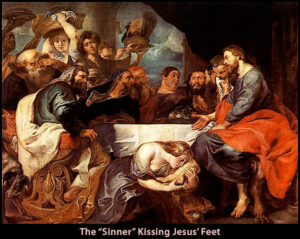 |
Gen 18:4 the hospitality of Abraham + 1 Sam 25:41 “behold, your handmaid shall be a slave to wash the feet of the servants of my lord” + Gen. 19:2; 24:32; 43:24 |
| Luke 4:28-30 and John 7:30 Jesus walks through the hostile crowds who want to seize him. | = the new Elisha, 2 Kings 6:18-20 |
| Matthew 26:53 Jesus speaks of a heavenly army ready to come to his defence: more than a dozen legions of angels | = like Elisha, a mountain filled with horses and chariots of fire, 2 Kings 6:16-17 |
| Matthew 17:17 (unbelieving and wicked race) | = Deut 32:5 (corrupt and wicked race) + Wisdom, Prov 8:8 “there is nothing perverse or treacherous in me” |
| Commands not to tell others he is the Messiah | = Isaiah 42:1-2 “my servant will not cry out or lift up his voice to be heard in the streets” |
| The 72 = the entire world | Genesis 10 72 tribes of the earth |
| Sending the Twelve out two by two | Deut 19:15 A minimum of two witnesses required to establish a matter |
| wear sandals | Exodus 12:11 “This is how you are to eat it: with your cloak tucked into your belt, your sandals on your feet and your staff in your hand. Eat it in haste; it is the Lord’s Passover.” — the liberation from Egypt |
| working clothes, loins girded, do not salute anyone on the way | = 2 Kings 4:29 “and Elisha said, ’Gird up your loins and go. If you meet someone, don’t say hello’” |
| Luke 10:7 eat and drink whatever they give you | = the Levites, Numbers 18:31 |
| Mark 9:38-39 John, one of the Twelve, said to Jesus, “Master, we saw someone casting out evil spirits in your name. We told him to stop because he was not one of us.” Jesus replied, “Don’t stop him…” | Numbers 11:25-29 However, two men, whose names were Eldad and Medad, had remained in the camp. They were listed among the elders but did not go out to the tent. Yet the Spirit also rested on them, and they prophesied in the camp. 27 A young man ran and told Moses, “Eldad and Medad are prophesying in the camp.” 28 Joshua son of Nun, who had been Moses’ aide since youth, spoke up and said, “Moses, my lord, stop them!” 29 But Moses replied, “Are you jealous for my sake? I wish that all the Lord’s people were prophets and that the Lord would put his Spirit on them!” |
| Luke 21:38 the people came to the Temple early in the morning to hear Jesus | = Sirach 5:12 [in some versions] “those who rise up early in the morning for [wisdom] will be filled with joy” |
| Matthew 11:29-30 “Take my yoke on you… my yoke is light…” | = Wisdom, Sirach 6:24-29 “Put Wisdom’s chains around your feet and her yoke around your neck. …. and she will become your joy.” |
| Luke 9:61 the disciple who turns back, “Lord, permit me to take leave of my family first” | = 1 Kings 19:20 Elijah chose Elisha to be his disciple, and Elisha replies, “Let me kiss my father and mother farewell” |
| Luke 10; Matthew 9:37 the harvest is plentiful | = sign of the end-time, the last judgment, Joel 3:13, “swing the sickle, the harvest is ripe” |
| Jesus and his disciples collect the corn on the Sabbath day | = Isaiah 27:12 “God will begin the threshing; he will pick up each son of Israel one by one like an ear of wheat” + 17:5 |
| Luke 11:27 Blessed the womb that bore you and the breasts that gave you suck | Genesis 49:25 The blessing of Jacob for his son Joseph, “the blessings of the breast and womb” |
| Teaching in parables and precepts: | = Psalm 78:2 “I will open my mouth in parables and utter hidden things from of old” |
| Mark 2:27-28 “Then he said to them, ‘The sabbath was made for man, and not man for the sabbath'” | = Talmud, Yoma 85b: “The Shabbat is given to you, it is not you who are given on the Shabbat”; see also Mekhilta 31:13 |
| Matthew 5:13; Mark 9:50; Luke 14:34: “You are the salt of the earth. But if the salt loses is savour, with what shall it be salted?” | concerns the Jewish people + a proverbial expression, see Bekhorot 8b [Baeck, 139] |
| Matthew 5:17; Luke 16:17 “I wish to take nothing away and I wish to add nothing” | = Deut 12:32 “without nothing added and nothing taken away” |
| Matthew 6:19; Luke 12:33 “Do not store up treasures on earth… Store up treasures in heaven” | = parallel passages in the Talmudic literature [Baeck, 140] |
| Matthew 5:33-37 33 “Again, you have heard that it was said to the people long ago, ‘Do not break your oath, but fulfil to the Lord the vows you have made.’ 34 But I tell you, do not swear an oath at all:. . . 37 All you need to say is simply ‘Yes’ or ‘No’; anything beyond this comes from the evil one | As we find in the Haggadic tradition sometimes many verses are mixed up together: Lev. 19:12; Ps. 50:14; Num 30:3; Deut 23:22. The other biblical verses cited here are Isa. 66:1, Isa. 48:3 [Baeck 142] |
| Matthew 6:14; Mark 11:25 “If you forgive, your heavenly father will forgive yours, too; but if you don’t….” | = a popular adage, see Sirach 28:2, Shabbat 151b [Beck, 144] |
| Matthew 5:38-39 38 “You have heard that it was said, ‘Eye for eye, and tooth for tooth.’ 39 But I tell you, do not resist an evil person. If anyone slaps you on the right cheek, turn to them the other cheek also.“ | Isaiah 50:6 “I offered my back to those who beat me, my cheeks to those who pulled out my beard; I did not hide my face from mocking and spitting.” [Baeck, 145] |
| Matthew 6:6 “When you pray, withdraw into your room” | = Isaiah 26:20 “Go, my people, enter your rooms and shut the doors behind you” — addressed to the people |
| Luke 10:25 Parable of the Good Samaritan | |
| the man half-dead | = the people of Israel (represented as a solitary man) |
| healed his wounds by pouring oil | = anointing of kings, priests and prophets? |
| Mark 6:14 the beheading of John the Baptist | The Jews lost their head? |
| Mark 6:22 Salome dances | = the daughter of Jephthah who comes to meet him dancing Judges 11:34 |
| Mark 6:23 “I will give you even half of my kingdom” | = Esther 5:3 the king offers queen Esther up to half of his kingdom; she requests he attend the feast |
| Mark 6:34; Matthew 9:36 “they were like sheep without a shepherd” | = Jeremiah 23:1-6 “Woe to the shepherds who are destroying and scattering the sheep of my pasture!” + Ezekiel 34:23 + Num 27:17 Moses sends Jesus/Joshua “so that the people will not be like sheep without a shepherd” |
| John 10 “I am the good shepherd“ | = Psalm 23 “The Lord is my shepherd” |
| the shepherd gives his life | = 1 Samuel 17:34 |
| Luke 15 the sheep lost and found | = Ezekiel 34:16 “I will search for the lost sheep” |
| Luke 13 the parable of the fig tree | = Genesis 3:7, the leaves of the fig tree covered Adam’s nakedness + Hosea 9:10, “Like the fruit on the fig tree in the prime season I saw your fathers” |
| Matthew 21:19; Mark 11:12-14 the cursing of the fig tree without figs | = the people of YHWH, without fruit = sin |
| at Bethphage | = house of figs? |
| Matthew 24:32-33 The kingdom of God is like a fig tree. When it produces young twigs and leaves appear you know that the harvest is near. | “is based on a verse from Cant. 2, 13 which was interpreted in the past in a Messianic sense. At its foundation also probably lies a play on words between [Hebrew] KeTS (the end, the messianic age) and KaYiTS (harvest, summer)” [Baeck, 152] |
| Luke 19 Zacchaeus | the sinner |
| at Jericho | =Jericho is the gateway for the Hebrews to the Promised Land (Joshua 6). This is where you have to start over, as from scratch, if the first covenant failed. |
sycamore, false fig tree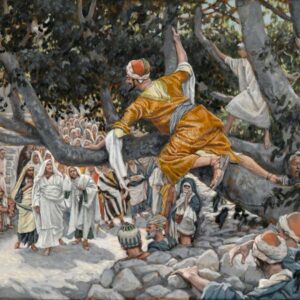 |
= The sycamore or false fig tree is the symbol of a deviated Israel. This tax collector, collaborator of the Romans, is excommunicated from the Temple and from the authentic Israelite community; we despise him and reject him // “Nathanael under the fig tree, Zacchaeus on the sycamore; one still under the Law, the other rising above the Law” (St Ambrose: Commentary) |
| Matthew 22:1-10 Invitation to the banquet; sending the servants | = Wisdom, Prov. 9:3 “She has sent out her servants, and she calls from the highest point of the city” |
| The Bread | = The Law |
| Mark 6; Matthew 14; John 6 The miracle of the multiplication of loaves | = The manna of Exodus 16, called bread v.4 (Numbers 11:7-9) |
One has to feed them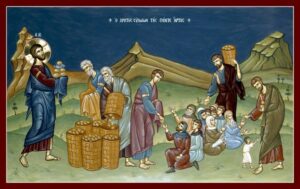 |
YHWH instructs Moses that it is necessary to feed the people, + = 1 Kings 17:14 Elijah and the widow “the flour will not fail” + see 2 Kings 4:43 the miraculous distribution of the bread by Elisha: “How could I distribute to so many people?” And leftovers + the priest Melchizedek Gen 14:18 + the messiah David distributing to each a basket of bread 2 Sam 6:18-19. |
| seated on the grass | = Psalm 22 on the fresh grass meadows |
| 5 loaves and 2 fish | = 5 Books of the Law |
| 12 baskets remain | 12 tribes? |
| Mark 8 the second multiplication of bread | = the giving of the law to the gentiles |
| 7 loaves, 7 baskets left over | the universe |
| Mark 8:19-21 19 When I broke the five loaves for the five thousand, how many basketfuls of pieces did you pick up?” “Twelve,” they replied. 20 “And when I broke the seven loaves for the four thousand, how many basketfuls of pieces did you pick up?” They answered, “Seven.” 21 He said to them, “Do you still not understand?” | = When I gave the law to the gentiles, I kept the twelve tribes of Israel [?]
4000 men = the 4 cardinal points the saying carries a symbolic meaning |
| John 6:33 the living bread comes down from heaven | = Wisdom in Proverbs 9:5 “Come, eat my bread” + Exodus 16:15-16 – the manna |
| Parable of the seed that falls to the ground | = Joshua 23:14 “Now I am about to go the way of all the earth. You know with all your heart and soul that not one of all the good promises the Lord your God gave you has failed. Every promise has been fulfilled; not one has failed.” |
| Luke 11:29 — asking for signs | Judges 6:36-40 Gideon asks for a sign from God |
Mark 6; Matthew 14 Walking on the sea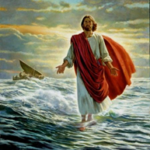 |
The Exodus of the People of Israel on the Sea of Reeds Exodus 14-15 and on the Jordan Joshua 3-4 + Job 9:8 “God who walks on the heights of the sea” + Sirach 24:5-6: Wisdom said “I walked on the waves of the sea” |
| the fear of the disciples | the fear of the Israelites, Exodus 14:10 |
| walking on the sea | the axe blade of Elisha which floats on water 2 Kings 6:6 |
Matthew 9:20; 14:36; Mark 6:56; Luke 8:44 to be saved by touching the fringes of his cloak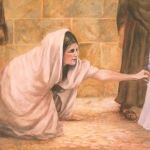 |
Moses + the cloak of Elijah 2 Kings 2
= the conversion of the gentiles, Zechariah 8:23 This is what the Lord Almighty says: “In those days ten people from all languages and nations will take firm hold of one Jew by the hem of his robe and say, ‘Let us go with you, because we have heard that God is with you.’” |
| Mark 7 surpassing dietary restrictions | = announcing the law to the gentiles |
| Mark 7 healing the deaf-mute | = Isaiah 29:18 “In that day the deaf will hear the words of the scroll”; Isaiah 35:5-6 “and the mute tongue shall shout for joy” |
| gentile lands | = announcing the law to the gentiles |
| Mark 8:31 “he taught them that the Son of Man must be rejected“ | = Psalm 118:22 the stone that the builders rejected has become the cornerstone + Isaiah 52-53 the Suffering Servant |
| Matthew 22:34 “Hearing that Jesus had silenced the Sadducees, the Pharisees got together.” | Psalm 2:2 “the rulers band together against the Lord and against his anointed” |
.
Future posts will continue this series.
Charbonnel, Nanine. 2017. Jésus-Christ, Sublime Figure de Papier. Paris: Berg International éditeurs.
Baeck, Leo. 2002. Les Evangiles, Une Source Juive. Paris: Bayard.
Genot-Bismuth, Jacqueline. 1995. Le Sage et le Prophète: Le Défi Prophétique Dans Le Monde Juif Des Premiers Siècles. Paris: F.X. de Guibert.
If you enjoyed this post, please consider donating to Vridar. Thanks!

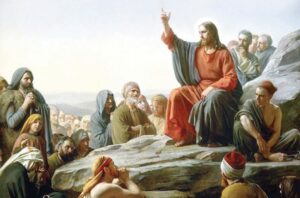
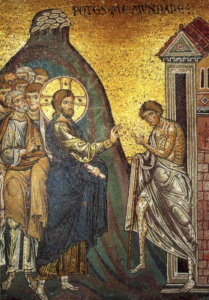
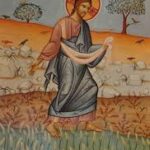
I would love to see what is left were the Midrashic content removed from the gospels (taking a bit of a Jeffersonian turn by eliminating the dross). I am currently reading “Mark, the Canonizer of Paul” and it appears that Mark’s objective was just that. And the three other canonical gospels borrow so heavily from Mark, they basically put their stamp on that work without knowing what motivated it.
This analysis overreaches. Some of these correspondences are deliberate, but others are coincidences imposed by the modern reader.
Mark could not have written a single sentence if he had kept in mind the basket of puzzle pieces of Scripture, and determined to assemble a new text entirely from them. Can you do that? Writers have to be to some extent carried away within the overall structure of the scene, or the story, or an argument. Source criticism consistently fails to take the point of view of the writer of their studied biblical text, a failure I find hard to understand as source critics themselves are writers!
Once Mark made a decision about the action of a scene, there were a limited number of possible ways the scene could unfold. For one example among many, look at the boat trip to Gerasa/stilling of the storm. The theological point to the scene is that Jesus can command the winds. So there have to be winds, and Jesus has to calm them. It just so happens that Scripture is capacious enough that apparent references to Scriptural texts can be found (in the chart above, Hosea 13:15 and Psalm 78:65-66).
Some scenes in GMark were written by an editor, and those scenes–such as the First Feeding Miracle–could be closer to Scriptural sources because the basic structure of the scene, the relationship of the characters, the stage in Jesus’s journey, had already been created by Mark. The same is true for additions by Matthew and Luke. The authors were creating only a single scene as a pastiche, not an entire story.
This is hardly newsworthy. This has been known and well documented for years.